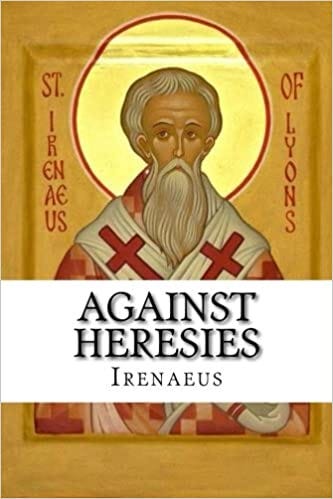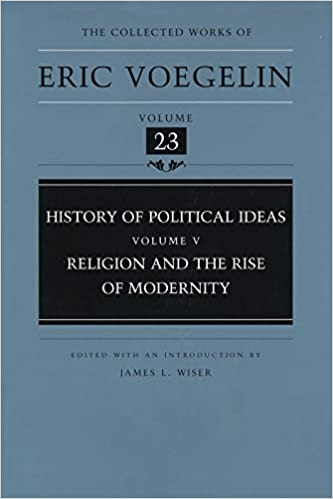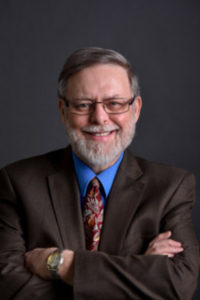
Gnosticism and Naturalism: Why We Must Reject Both!
In the history of the church, we have always had two big heresies seeking to undermine the Christian doctrines of creation and eschatology: Gnosticism and Naturalism.
Modernity at its worst is a combination of these two heresies
G nosticism is the doctrine that matter is evil, and salvation consists of escape from the material world to a non-material world. The Gnosticism that confronted the early church originated in a Persian dualism, which was a form of mythology in which the soul became trapped in a material body and the goal was for the soul to get free and not be reincarnated. We probably underestimate today how pervasive this heresy actually was. Irenaeus fought it tooth and nail in the second century. The church at Rome threw the Gnostic Marcion out and gave him his donation back rather than give up the Old Testament. Augustine was a Manichee for nine years prior to his conversion and baptism.
nosticism is the doctrine that matter is evil, and salvation consists of escape from the material world to a non-material world. The Gnosticism that confronted the early church originated in a Persian dualism, which was a form of mythology in which the soul became trapped in a material body and the goal was for the soul to get free and not be reincarnated. We probably underestimate today how pervasive this heresy actually was. Irenaeus fought it tooth and nail in the second century. The church at Rome threw the Gnostic Marcion out and gave him his donation back rather than give up the Old Testament. Augustine was a Manichee for nine years prior to his conversion and baptism.
Eric Voegelin has demonstrated that Gnosticism has mutated in the modern era into a form that makes it uniquely modern. Whereas in the ancient world, where there was a widespread openness to the supernatural, today we live in a culture dominated by “scientific materialism” and so a myth that is framed in supernatural terms is not suited to win assent. But Voegelin’s key insight is that the essence of Gnosticism is its hatred of matter, not the supernatural myth in which it was packaged. So, he was able to interpret Marxism and other modern political religions as Gnostic.Gnosticism is the doctrine that matter is evil, and salvation consists of escape from the material world to a non-material world. Click To Tweet
Even though the Marxist “classless society” is presented in material terms, it is a Utopia in the most literal sense of meaning that it is “nowhere.” It never has appeared and never will. It is a critical idea, that is, a point of comparison that is so perfect that the present reality can never measure up to it and so it can function as a justification for permanent revolution. (This, by the way, is the essence of “critical theory”). Permanent revolution serves the interest of those who wish to grab power for themselves; it is a fig leaf of morality for the will to power. All it does is convince gullible people that the current society should be destroyed just because it does not measure up to the ideals imagined by the theorists.
 So, Voegelin sees Marxism (like Naziism, Maoism and other modern political religions) as sharing the essential Gnostic trait of hatred of this world as it exists even though it proudly proclaims itself to be “scientific materialism.” Science here is actually functioning as a myth, although modern people naively conceal this truth from themselves because they want to think of themselves as “advanced,” “scientific” and “modern.”
So, Voegelin sees Marxism (like Naziism, Maoism and other modern political religions) as sharing the essential Gnostic trait of hatred of this world as it exists even though it proudly proclaims itself to be “scientific materialism.” Science here is actually functioning as a myth, although modern people naively conceal this truth from themselves because they want to think of themselves as “advanced,” “scientific” and “modern.”
Philosophical naturalism is the air we breathe in the contemporary world and it has been so since the triumph of the nominalism, materialism and mechanism of the French Enlightenment. When Kant said in the preface his Prolegomena to Any Future Metaphysics that David Hume had awakened him from his dogmatic slumbers, what he meant was that he was joining with those who were rejecting the principle of causality. Without the principle of causality, there could be no proofs for the existence of God – not even Aristotle’s Unmoved Mover, let alone the God of Christianity. Without God there is no doctrine of creation and without a doctrine of creation the whole of classical metaphysics collapses. This is why he had to undertake the program of creating a new metaphysics – the critical philosophy. The fate of his massive efforts to create a critical philosophy has been, despite the best efforts of many philosophers in the Anglosphere’s linguistic tradition, a slow descent into first skepticism, then relativism and finally nihilism. Postmodernism is just nihilism with a happy face.Philosophical naturalism is the air we breathe in the contemporary world and it has been so since the triumph of the nominalism, materialism and mechanism of the French Enlightenment. Click To Tweet
Hegel’s great system of God reconceived in naturalistic terms as history unfolding itself has been the great metaphysical alternative to Kant’s critical philosophy. Hegel’s general approach has been embraced by many theologians, although many argue over whether this should entail a non-theistic system, pantheism or panentheism. Many try to reconceive God as existing within or on the same plane of being as the rest of the cosmos in theistic personalism. All such options, however, are one form or another of naturalism. All deny the biblical and historic Christian doctrines of Divine transcendence based on creation ex nihilo.
Thus, we have in modernity the two great heresies of Gnosticism and Naturalism riding high in the saddle. The temptation we must resist at all costs is to use one to try to fight off the other. This is similar to the situation in the fourth century with regard to the doctrine of the Trinity. On the one hand you had modalism, which denies that the three persons are persons simultaneously and says that God is one person who appears at different times as Father or Son or Spirit. On the other hand you had subordinationism, which says that the Father, Son and Spirit all exist as distinct persons but the Son and Spirit are creatures of the Father and subordinate in being to him. Between 325 and 381 much confusion ensured as one party would accuse the other party of leaning too far toward modalism or flirting with subordinationism. (Athanasius, for example, was constantly being accused of being a cryptic modalist.) The neo-Arians or heteroousians eventually came out into the open as being real subordinationists and this clarified the situation immensely after 360. But the solution adopted in 381 was different from both heresies and satisfied neither heretical party. This is precisely what it was meant to do.
What we see today is a similar situation. We see Naturalism and Gnosticism each presenting itself as the solution to a problem and the church wavering between them because each can present a credible case as to why the other is bad. But what we need is a solution that rejects and clearly charts a path separate from both of them.
What we don’t need is for people to think that the best medicine for the church’s dangerously Gnostic leanings is a little dose of social action to focus people on justice in the here and now, as if a little Naturalism would help alleviate the Gnostic symptoms. Likewise, we don’t need to react against the liberal social gospelers and liberation theologians by shaking the dust off our sandals and retreating to a hands-off separatism. The answer to liberal activism is not to become Amish and the answer to separatism is not to join the social justice warriors.
What then is the answer?
It is all there in the Book of Isaiah and it has been rediscovered numerous times in the history of the church. We must assert that “this is my Father’s world,” and nothing created is either so bad that it cannot be redeemed or lies beyond the scope of God’s providence. All creation is destined to attain its telos in Jesus Christ, and nothing can stop the ultimate triumph of God. The problem with Naturalism is not that it has too high a view of material reality, but that it has too low an estimate of its value. What they thought was just a myth (or in modern jargon, a “limiting concept”), actually turns out to be the literal destiny of creation. Heaven really is coming to earth and our prayers will finally be answered.
However, the path from here to there leads through what the biblical prophets called the “Day of the LORD,” which is a time of great judgment on the creation that is worse than anything of which the Gnostics ever dreamed. Fire, death, hell and destruction lie between us and the New Heavens and New Earth. Anyone who has any hope whatsoever of surviving the looming catastrophes had better take refuge in the Messiah because there is no other hope.All creation is destined to attain its telos in Jesus Christ, and nothing can stop the ultimate triumph of God. Click To Tweet
In different ways, the Christian message is both worse and better than the heretical versions. The world is God’s creation, and it is being redeemed. But the world being redeemed means that it will have to be purged by fire to get rid of the filth and sin. This is good news for those who put their faith in Jesus Christ but bad news for everyone else. It is particularly bad news for the Gnostic heretics and the Naturalist heretics. The former want to bring their own judgment on the world but God’s providence will not let them do so completely. The latter want to bring about heaven on earth without judgment, but God’s providence will not let them now or in the future.
The path of faithfulness going forward involves rejecting both Gnosticism and Naturalism. The particularly pernicious feature of much of contemporary Western society is its propensity to combine the worst of both heresies into one hot mess of a sick worldview. Its creed is “There is no world but this one and it is totally evil.” We see this pathological way of thinking all around us today. The Christian message, however, is that this world is God’s good creation messed up by sin, but it will be redeemed through fire and judgment and made into the New Heavens and New Earth.
*This article was originally published in Dr. Carter’s newsletter, The Great Tradition.

